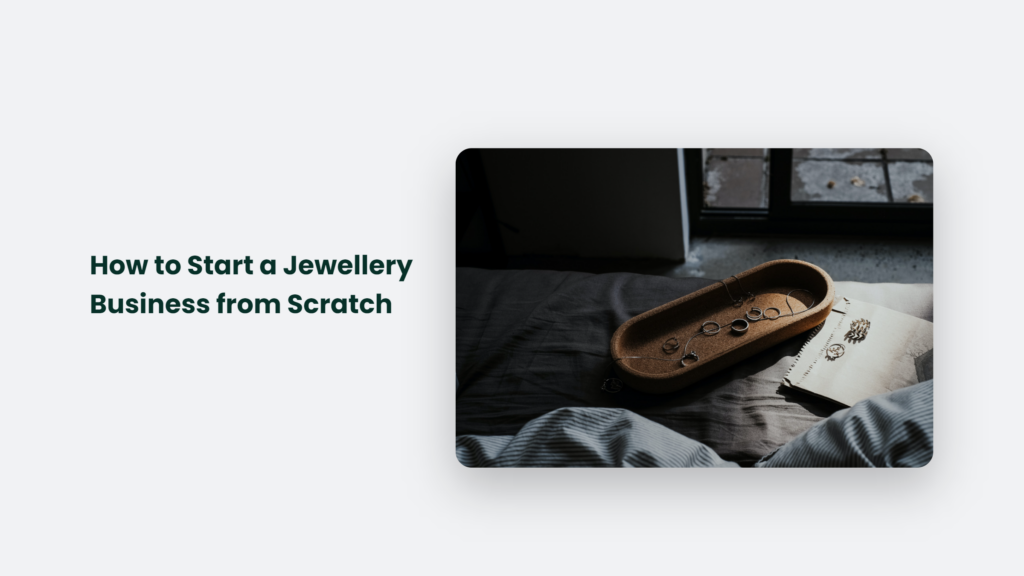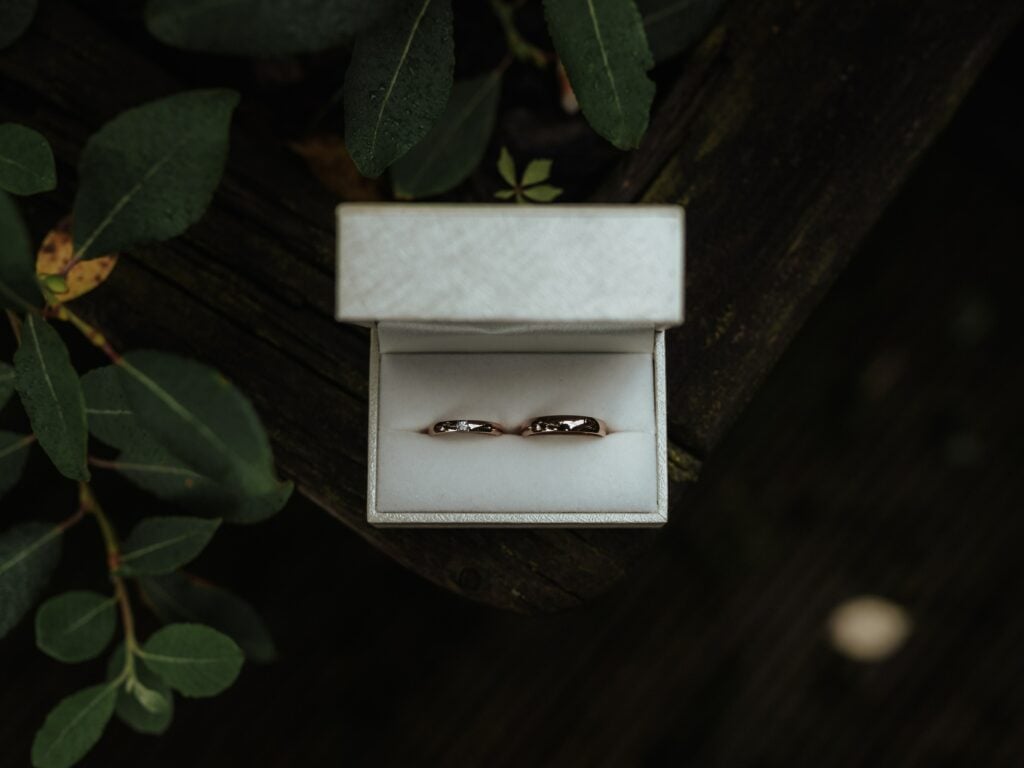Have you ever dreamed of starting your own jewellery business? Of being your own boss, making beautiful pieces of wearable art, and seeing your creations adorned by happy customers?
It’s an alluring vision. But like any dream worth chasing, it takes grit, courage, and a bit of recklessness to turn it into reality.
In this guide, I’ll walk you through the entire process of starting a jewellery business from absolute scratch. I’ll cover everything from developing your initial idea to securing startup funding to actually making sales.
My goal is to prepare you for the exhilarating ride ahead by telling you what it takes to get a jewellery business off the ground. I won’t sugarcoat the challenges, but I’ll also share tips to help you power through obstacles and ultimately succeed on your own terms. So, if you’re ready to turn your passion into profits, let’s get started.

How to Start a Jewellery Business:
Step 1: Make Sure You Actually Want to Start a Jewelry Business
Before diving headfirst into entrepreneurship, it’s wise to first get clear on why you want to start a jewellery business in the first place.
Ask yourself: Is this something you’re you’re genuinely passionate about? Or are you just bored, want to make more money, or are going along with someone else’s idea?
- Are you willing to work hard hours for little pay at first?
- Can you handle the stress and uncertainty of being fully responsible for your income?
- Are you comfortable taking financial risks and investing your own money?
You’ll likely burn out when things get tough if your motivation doesn’t come from a deep love of jewellery design and creation. Because, trust me, it will get tough.
But if making jewellery truly lights you up inside, the work won’t feel like work. The late nights and early mornings will be a labour of love. That passion will sustain you through the inevitable challenges.
So before going all in, dig deep and ensure this aligns with who you are and what you care most about.
Step 2: Refine Your Jewellery Business Idea
Once you’ve confirmed your passion, it’s time to start refining your vision for the business.
Ask yourself questions like:
- What type of jewellery do I want to make (rings, necklaces, bracelets, etc.)?
- Do I want to specialize in certain materials like gold, silver, or gemstones?
- What’sWhat’s my target price range?
- Who is my ideal customer?
- What makes my jewellery different or better than what’s already out there?
Narrow down the specifics so you can develop a unique brand and stand out in a crowded market.
It also helps to identify businesses you admire and analyze what makes them successful. Notice their branding, pricing, and customer experience for inspiration.
Step 3: Choose a Business Structure
When starting a jewellery business, you must choose a formal business structure. The most common options are:
Sole Proprietorship
It is the simplest structure where it’s just you owning the business as an individual. You retain full control and keep all profits. However, you’re also personally liable for debts and legal issues.
Partnership
Starting the business with one or more partners allows you to share ownership and combine your resources. You’ll divide responsibilities, profits, and losses based on your partnership agreement.
LLC (Limited Liability Company)
It separates your business assets from personal assets for liability protection. It’s more complex than a sole proprietorship but provides more protection if sued.
Corporation
It fully separates your business as its own legal entity and provides the highest level of protection. But it’s the most complex and expensive to set up and maintain. I’d recommend starting as a sole proprietorship or LLC to keep things simple. You can always evolve your structure later as the business grows.
Step 4: Register Your Business
Once you’ve chosen a structure, it’s time to make it official by registering your business.
The specific requirements vary by state. But in general, you’ll likely need to:
- Choose an official business name
- Register for state and local licenses and permits
- Obtain an Employer Identification Number (EIN) from the IRS
- Set up business bank accounts.
It may sound daunting, but it’s fairly straightforward. Your local Small Business Administration office can guide you through the process.
Step 5: Sort Out Your Finances
Starting any business requires capital to get up and running. For a jewellery business, you’ll need money to cover things like:
- Jewellery supplies and tools.
- Workshop or studio space
- Website development
- Marketing expenses
- Professional services (legal, accounting)
Add up these startup costs to determine how much funding you need. Then look at options to raise money, including:
Personal Savings: Tap into your own savings if possible. It avoids taking on debt.
Crowdfunding: Platforms like Kickstarter or Indiegogo let you raise funds from backers. Offer rewards for different contribution levels.
Business Loans/Grants: Banks, credit unions, and nonprofit lenders offer financing options for startups. Grants are also available through some government and private programs.
Investors: Connect with angel investors or venture capital firms to get startup capital in exchange for equity in your business.
Friends and Family: People close to you may be willing to invest in your idea. Be cautious about mixing business and relationships.
A combination of sources is usually best. Just make sure to analyze costs and repayment terms before taking on any debt.
Step 6: Source Your Jewelry Making Supplies
Now for the fun part – picking out quality materials and tools to create your jewellery!
As a beginner, start with essential supplies like:
- Metals: Gold, silver, copper, and more. Buy sheets, wires, and casting grain.
- Gemstones: Precious, semiprecious, imitation, and lab-created stones.
- Beads and Findings: Clasps, chains, jump rings, bead assortments.
- Jewelry Tools: Pliers, cutters, mandrels, torches, polishers, etc.
- Workshop Basics: Jeweler’s bench, ring mandrel, safety supplies.
Marketing Strategies for Jewellery Businesses
To successfully market your jewellery business, you should consider combining online and offline strategies. Here are some effective marketing strategies and ideas to help boost your jewellery business:
Attend craft fairs and conventions: Set up a booth at craft fairs, shows, and conventions to display your jewellery and showcase how they are made. It can leave a lasting impression on potential customers.
- Build a user-friendly website: Create a professional, easy-to-navigate website that showcases your products and allows customers to purchase online.
- Optimize your website for search engines: Implement search engine optimization (SEO) strategies to improve your website’s visibility on search engines, making it easier for potential customers to find your business.
- Utilize social media: Use social media platforms to promote your products, engage with customers, and share behind-the-scenes content. It can help build brand awareness and attract new customers.
- Email marketing: Send newsletters and promotional emails to your subscribers to keep them informed about new products, sales, and events.
- Content marketing: Create blog posts, articles, and other content related to your jewellery business to attract and engage potential customers.
- Invest in high-quality product photography: Use high-quality photos to showcase your jewellery on your website and social media platforms, as this can help attract customers and increase sales.
- Collaborate with influencers: Partner with influencers in your niche to promote your products and reach a wider audience.
- Offer promotions and discounts: Attract customers with limited-time promotions, discounts, or exclusive deals.
- Analyze your competition: Research your competitors’ pricing, marketing strategies, and product offerings to identify areas where you can differentiate your business and stand out in the market.
Pricing Strategies for Jewelry Businesses
To set the right prices for your jewellery, consider the following factors:
Production costs: Calculate the cost of materials, labour, and overhead expenses associated with producing your jewellery.
- Market research: Research the prices of similar jewellery products to understand the price range customers are willing to pay.
- Perceived value: Consider the perceived value of your products, which can impact your customers’ willingness to pay.
- Profit margin: Ensure that your pricing strategy covers your costs and leaves you with a profit.
Some common pricing formulas for jewellery businesses include
- Labor + materials x (a number or percentage) = selling price.
- Labor + materials + packaging x (a number or percentage) = selling price.
Remember to adjust your pricing strategy based on market trends, customer feedback, and business goals.
Frequently Asked Questions:
How long does it take to become profitable?
It typically takes 1-2 years to build a customer base and become profitable. Starting out part-time can help minimize risk. Build sufficient savings to cover personal and business expenses for at least 12 months.
What skills are most important for running a jewellery business?
Important skills include jewellery design, photography, marketing/social media, website development, accounting, customer service, time management, and attention to detail. Hiring employees or contractors can help fill skill gaps.
What are some common challenges faced by new jewellery businesses?
Some common challenges include high startup costs, pricing products profitably, marketing effectively on a limited budget, managing cash flow, and building a customer base from scratch. Staying organized, being flexible, and leveraging professional services can help overcome these hurdles.
The Bottom Line:
Starting a jewellery business is an exciting opportunity to turn your creative passion into a thriving enterprise. But it requires immense commitment, grit, and strategic preparation.
This guide provided actionable steps to get started – from refining your business idea to marketing and pricing your products. While the road ahead will have challenges, your passion and resourcefulness can ultimately drive success on your own terms.
Remember to start small, focus on continuous learning, and don’t be afraid to make adjustments as you go. With dedication and smart planning, you can build a jewellery business that stands out from the competition and brings joy to customers for years to come.




